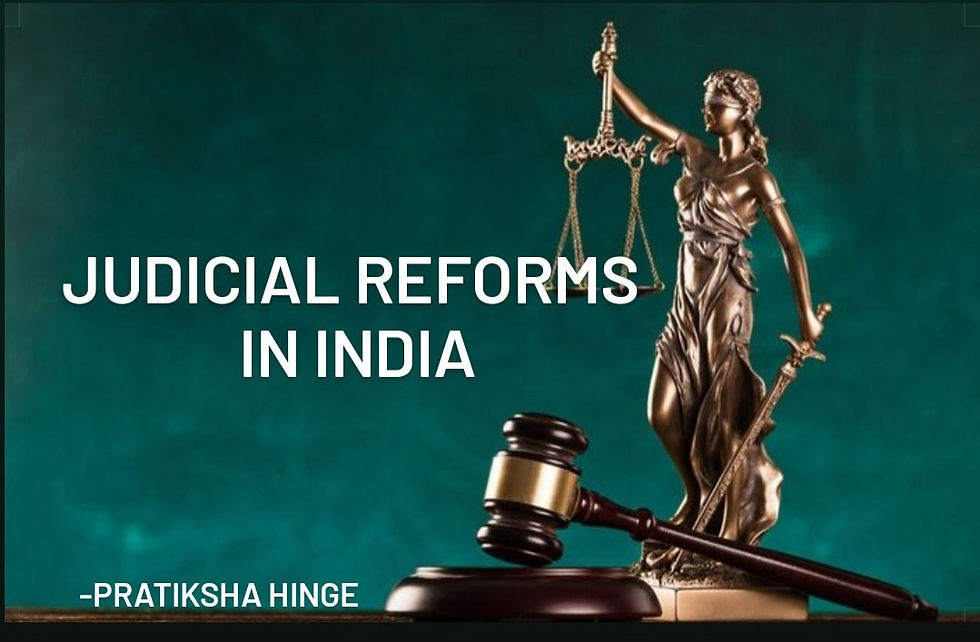“Justice delayed is justice denied and justice hurried is justice buried”
William Goldstone
INTRODUCTION

India is a country with huge number of population and every citizen has the right to move to the court if their rights are being violated. But how can our judicial system be more efficient to solve everyone's case? And for resolving such question judicial reforms are been made.
Judicial reform was introduced by Lord Cornwallis. He made changes in the judicial system in three years – 1787, 1790 and 1793. These were referred to as Judicial Plan of 1787, 1790 and 1793 respectively. In 1772 Warren hasting introduced a scheme of judicial administration and in such ways the Adalat system in India was founded.
So, the judicial system in India is the court system. The court has the authority to settle the conflicts. But the number of conflicts is increasing day by day and the pendency of the cases is also increasing and that's why there's a much need of judicial reforms in India and it should be the main development Agenda. In this way only the citizens can keep our faith and trust in judicial system of our country. The justice should be speedy as to maintain the rule of law and to deliver good governance.
PENDENCY OF THE CASES IN INDIA
In the court of Mathura 11 policemen were sentenced to imprisonment for life after 35 years of killing for the murder of Raja Man Singh Ruler of the former princely state. But such delay in the cases is not rare.
77 cases filed within the 1950s are still pending.
In Goa (1), Jharkhand (5), Odisha (2), Uttar Pradesh (24), Bihar (12), West Bengal (14) and Maharashtra (19), cases filed in the 1950s are still pending.
The earliest pending case was filed in 1951 in a court in West Bengal. In total 3.65 crore cases are still pending in supreme court, high courts and district courts as of February 1, 2020. This pendency in cases is due to the delay in justice, the lack of basic infrastructure for judges litigants and court staff, the poor people cannot afford the court fees and the high courts does not have regular chief justice for several months.
As judiciary is considered as the pillar of democracy so it should be powerful to manage and give good governance to the citizen.
Judicial reforms must be made for the speedy delivery of justice, and the number of vacancies for the judge post should be increased and a good infrastructure should be provided for the court staff. Lok Adalat and alternative dispute resolution cells should be equipped to reduce the burden of the judiciary at all levels.
In a meeting conducted by Niti Aayog Justice Chandrachud talked about the incorporating cognitive technologies directly into the dispute resolution workflow. Which will help in offering better litigation strategies.
Law commission suggests that the post of chief justice shouldn't be transferable, and there should be the equal role for executive, judiciary in appointment of judges.
And the judgement must be delivered in a reasonable time by the judges.
In Covid times the courts have been shut for months so the amount of pendency of the cases have increased. But thanks to the enhancement in technologies by which the important cases have been Heard virtually. But the lawyers and judges must have faced some issues as they were not used to search virtual hearings but still the core dump and the judiciary is working.
still the pendency of the cases is increasing at the lower level suggest district courts because of the inefficiency of the lower courts according to the data of NJDG the second biggest reason for the delaying of the cases is due to the struggle to secure the presence of witness and the reason of stay order still comes in the first place as nearly as half of all the cases are delayed because of stay orders.
SOME JUDICIAL REFORMS WHICH SHOULD BE MADE ARE AS FOLLOWS
Improvement in district courts: -
The renovation of the old existing court buildings should be done in order to make barrier free access to the litigants and the court staff. And the hygiene should be maintained by the ministry of drinking water and sanitation as they should take care of the safe drinking water under the Swachh Nyayalay project in coordination with the Supreme Court.
Increase judicial capacity: -
The judicial system must be efficient as possible and equitable as per the rule of law
Management of court: -
Management of courts is the very important factor to the judges of lower courts need to ensure professional management of their courts. The proper monitoring and controlling of the progress of cases from initiation of cases to trial should be managed. Case management technique is successfully implemented by Singapore and now it is recognized all over the globe.
Speedy judgement: -
The committee were formed under justice Malimath, in the year 1999 and 2002. Which aimed at the speedy disposal of cases, and the amendment was made effective from 21st July 2002.
THE COMMITTEE SUGGESTED
•There must be a prescribed time limit for filing written statements, issuing summons and amendment of pleading, etc. And Due to pressure from lawyer advocates it was withdrawn.
• A new section 89 was introduced to settle the cases outside the court if possible.
• Instead of presence before the court of law recorded evidence by issuing the commission under section 75 of CPC was introduced.
• Before the court of law, the time frame needs to be provided for the oral arguments.
• Restrictions on a right to appeal were made.
CONCLUSION
By taking such things into consideration, our judicial system can achieve a goal of EFFICIENT, INDEPENDENT, PROFESSIONAL and FAIR JUDICIARY which is important for the development of our country.
